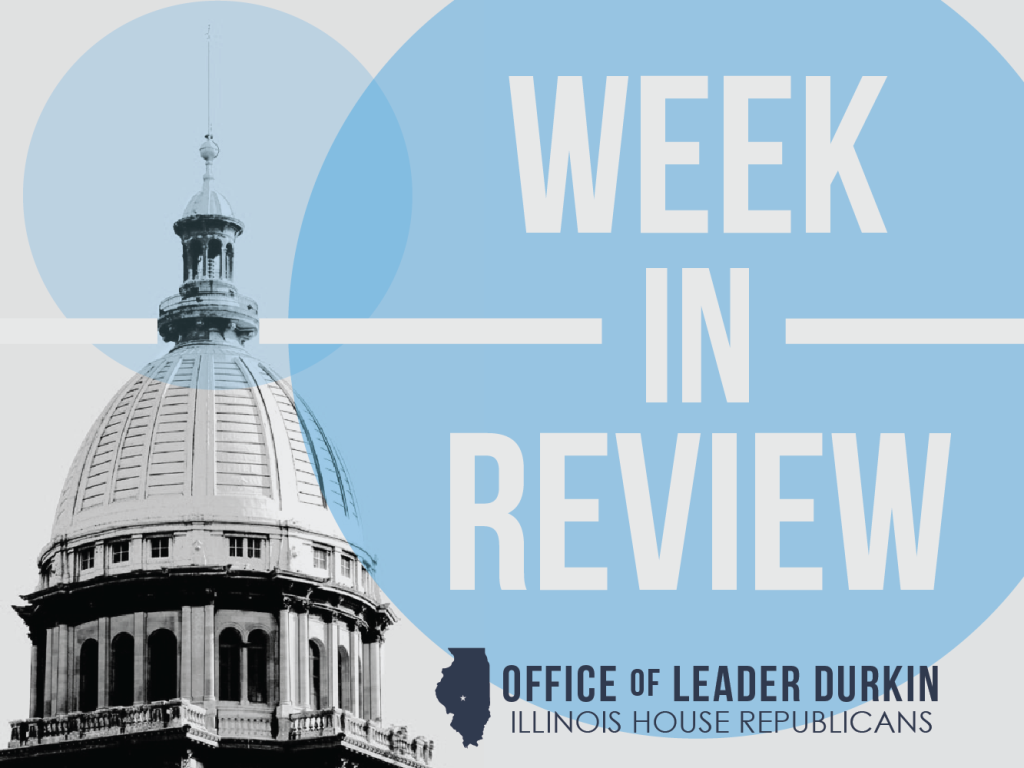Dear Friend,
Lawmakers spent much of this week passing bills through virtual committee meetings. We were in Springfield for a four-day Session, but legislators in the House spent very little time on the actual floor. There is much work to accomplish ahead of the scheduled April 8 adjournment date. The House has just three weeks to address rising crime, pass a balanced budget with NO new taxes, and pass legislation that helps ease the burden of rising inflation that is harming every single American family, senior, business, and working person. I’ve got an in depth look at how the majority party in Springfield has ignored House Republican anti-crime bills, a reminder on disaster and flooding preparedness, an update on now-indicted and arraigned former Speaker Michael J. Madigan’s corruption trial, and more in this week’s edition of Severin Says. Thank you for reading!
SEVERIN RESOLUTION RENAMES IL HWY 37 NORTH OF BENTON AS ‘TROOPER FRANK R. DUNBAR MEMORIAL HIGHWAY’
SPRINGFIELD – State Rep. Dave Severin has passed HJR 70 through the Illinois House, a measure that will rename a stretch of Illinois Route 37 north from Benton to Lake Benton Road as Trooper Frank R. Dunbar Memorial Highway.
House Joint Resolution 70 would name the stretch of highway north of Rep. Severin’s hometown of Benton on Route 37 as “Trooper Frank R. Dunbar Memorial Highway”. The request was brought to Rep. Severin by the Illinois State Police.

Trooper Dunbar joined the Illinois State Police on October 28, 1957 and was assigned to District 13 in DuQuoin. Trooper Dunbar was killed in an automobile accident on May 14, 1972 while patrolling Route 37, north of Benton. At the time, Trooper Dunbar was the first state trooper in 26 years to be killed in the line of duty and the first to be killed in a patrol car accident in Southern Illinois.
“As a measure respect and admiration for Trooper Dunbar’s sacrifice, as a token of our appreciation to his family members that live on to this day, and as a symbol of the respect we have for all Illinois State Troopers for putting themselves in harm’s way to protect Illinois citizens every single day, I ask for your yes vote in designating the stretch of highway north of Benton to Lake Benton Road on Highway 37 as Trooper Frank R. Dunbar Memorial Highway,” Severin said.
The House passed the Resolution with a unanimous vote. The measure now heads to the Illinois Senate for consideration.
###

Majority Rule and Rising Crime Rates
Illinois State Representative Deanne Mazzochi has accused the Democrat majority of not just being soft on crime, but creating state and local policies that allow crime to thrive.
Carjacking, burglaries, and retail thefts are on the rise in her district. Murders, robberies and gang violence are threatening other Chicagoland communities. And Democrats in Illinois won’t tackle the problem. They are comfortable sitting back while Illinois families endure violence in their neighborhoods with little recourse because Democratic lawmakers have refused to make laws to protect them.
According to Mazzochi, the Democrats in control of the committee tasked with hearing crime prevention legislation have focused on bills dealing with the rights of prisoners, criminal record expungement, and expanded parole, while ignoring a great number of bills targeted at combating crime.
Representative Dave Severin, the ranking Republican on the committee hearing criminal justice bills, agrees with Mazzochi’s assessment. He believes the prohibition of new public safety laws coupled with the recent passage of the Safe-T Act is fueling the violence and increased crime rates across the state. Many of the provisions in the Safe-T Act hamper the ability of law enforcement to do their jobs and at the same time it had made it easier for criminals to avoid prosecution, keeping them on the streets doing harm.
State Representative Patrick Windhorst, an experienced prosecutor, says law enforcement officials in his district have been vocal about their concerns, especially about ending cash bail that is part of the Safe-T Act. Windhorst filed legislation to repeal the Safe-T Act citing the need to curb rising crime rates, but his legislation was not permitted a public hearing by the Democrat majority.
For all but two of the last 37 years, Democrats have held the majority position and thus control the Illinois House of Representatives. They decide what bills are sent to committee and whether or not those bills actually receive a public hearing.
In recent years, the new Democrat leadership has found it necessary to flex their muscle in the General Assembly by refusing to let bills combating crime see the light of day. Their reason? Because they can. Time and time again they have cited “majority rule” as the rationale for blocking bills that would keep Illinoisans safe.
Just because they can, doesn’t mean they should. Public hearings equal transparency and accountability. So when Democrats prevent legislation from receiving a public hearing they are purposely keeping Illinoisans in the dark. Legislation should go through rigorous debate with input from experts, proponents and opponents. Only after that should the majority play its upper hand, voting to pass or kill a bill. Keeping legislation from public debate is tyranny, not leadership.
The Democrat majority has gone too far and Illinois residents are paying for it.
###
FORMER SPEAKER MADIGAN ARRAIGNED in COURT
Former Speaker Michael J. Madigan was arraigned by a Federal court this week. The longtime head of the Democratic Party of Illinois was arraigned on a 22-count federal felony indictment. Madigan did not have to step foot in a courtroom for his first appearance however, and his “not guilty” plea was entered by his attorney. True to form, Madigan let others do the talking for him. The indictment leveled charges of racketeering and wire fraud against the former Speaker of the Illinois House. The charges are related to an alleged pattern in which former Speaker Michael J. Madigan is said to have weaponized his legislative leadership and political party leadership in the interests of his law firm and close associates.
“The Velvet Hammer” because of his ability to maximize pressure on others through his soft-spoken style.
Madigan’s arraignment was a procedure that officially acquainted him and his lawyers of the charges against him, and granted him standing as the defendant before a court of law. The former Speaker will now be granted time to study the charges against him, and to select a strategy for his criminal defense.
Reporters ask about former Speaker Madigan’s campaign money. The indicted former political party boss has a campaign fund of almost $10 million, much of which he can spend for his criminal defense. Millions of additional dollars were raised by Speaker Madigan and given to other Illinois politicians, many of whom are still in office. Reporters are asking questions about who received Madigan money, how much, what times the moneys changed hands, and what sorts of “key votes” on Illinois’ policy and future were taking place at the time these dollars where changing hands.
DISASTER PREPARATION – SPRING FLOODING
With snowmelt and heavy March rains comes the likelihood of flooding for many Illinois homes and farms, especially those located on clay soil or in bottomlands and floodplains. In the first week of March 2022, authorities had already published flood warnings for stretches of the Big Muddy River, Illinois River, Kaskaskia River, Ohio River, and the Wabash River. As March continues, these flood warnings will multiply as many Illinois rivers and streams lap at, or overflow, their banks.

Floods not only slow down spring farm work and close rural roads; they also damage property. The Illinois Emergency Management Authority (IEMA) maintains a webpage with useful public information about statewide flooding incidents. The webpage not only distinguishes between different levels of statements and warnings, but also contains information on how Illinoisans can act before, during, and after a flood to maintain safety and limit property damage. It is important to keep in mind that local water waste disposal infrastructure may be compromised in flooding incidents, so overflow waters should be treated as potentially hazardous.
Spring forward on Sunday – Daylight Savings Time

Daylight Saving Time begins this Sunday, March 13. Don’t forget to spring ahead one hour Saturday night.
Illinois will observe daylight time, with clocks one hour ahead of standard time, until the first Sunday in November (November 6). All 102 counties in Illinois observe Central Standard Time and Central Daylight Time. This marks a major difference from the neighboring states of Indiana, Kentucky, and Michigan, in which different counties within the state are in different time zones.
Stay Connected!
My office in Marion is available to serve you by appointment or phone Monday through Friday 8:30 AM – 4:30 PM. You may reach my office any time at 618-440-5090 or by visiting RepSeverin.com/contact and sending me a message. You can correspond by mail with my office at 600 Halfway Road, Marion, IL 62959
